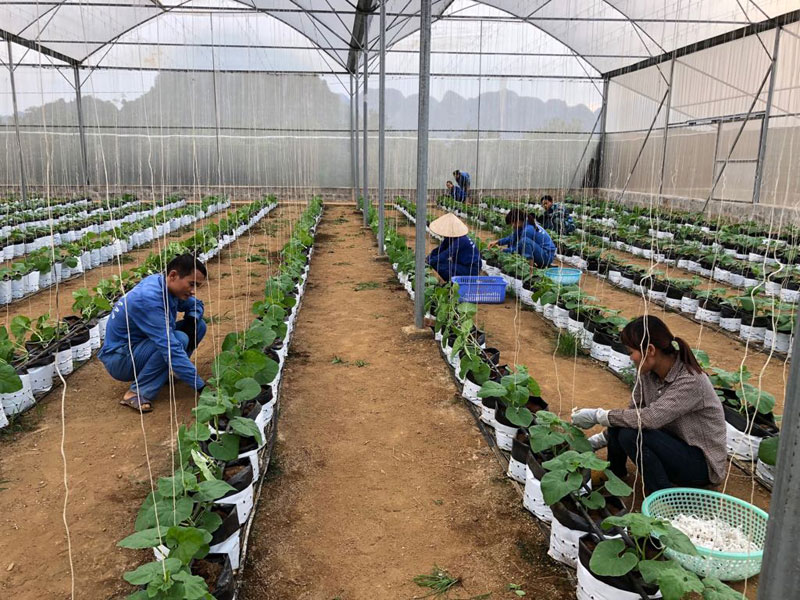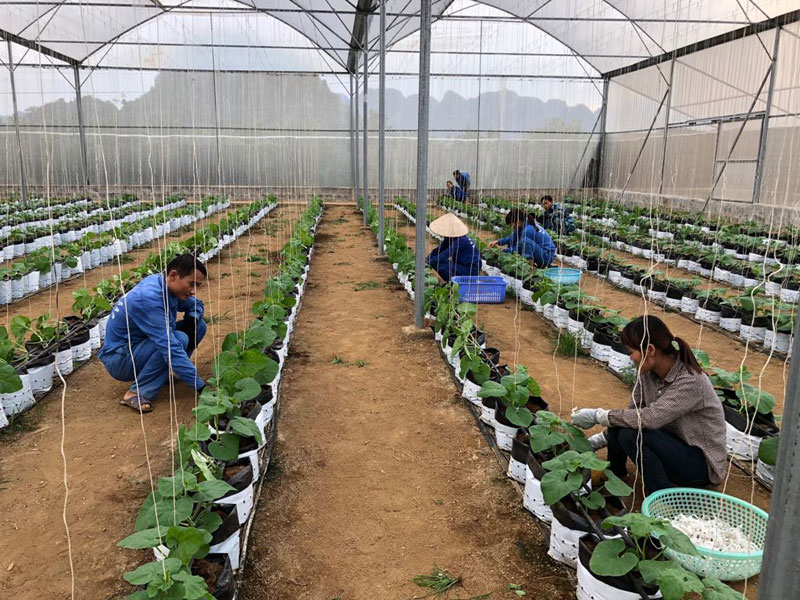
(HBO) – Nearly all crops in Hoa Binh province are currently cultivated outdoor using traditional methods which lack disease and fertilization control processes, resulting in unqualified and low-value products. In that context, the Hoa Binh GAP Co. Ltd, based in Thanh Ha township of Lac Thuy district, has launched a project on building net houses for organic honeydew and vegetable farming.

The
Hoa Binh GAP Co. Ltd in Lac Thuy district has taken the lead in applying high
technologies in vegetable and fruit production.
The company began agricultural production using
Industry 4.0 technologies in January 2016 by building infrastructure, including
building 5,000 sq.m. of net house and installing irrigation systems. One year
later, it cultivated honeydew melon plants in the 5,000 sq.m. of net house and
build another one hectare of net house, raising the net house area to 1.5ha out
of the total 4.3ha farming area.
This is still the first and only model applying
Industry 4.0 technologies in agriculture in Hoa Binh so far.
Thanks to the application of many technical
measures, plants have been farmed in the best possible conditions. Nearly 100
percent of pest and 80 percent of diseases has been prevented without using
plant protection chemicals. Productivity and quality of farm produce have been
improved and met food safety standards while 70 percent of the labour needed
for the work has been reduced.
The project has provided permanent jobs for 25 –
30 people and seasonal jobs for 20 – 25 others with average per capita
income of 3.5 – 4.5 million VND (about 150 – 195 USD) each month. It has not
only generated big profit for the investor but also helped improve local
residents’ awareness of applying science-technology in agriculture to raise
economic benefits and protect public health.
The project is an example of science-technology application
in Hoa Binh.
Products of the Hoa Binh GAP Co. Ltd have had
origin-tracing labels and been supplied mainly for supermarkets and stores
selling goods meeting the Vietnamese Good Agricultural Practices (VietGAP)
standards./.
According to data from the Hoa Binh Provincial Party Committee, the industrial production index for the first six months of 2025 is estimated to have increased by 20% compared to the same period last year. This marks the highest year-on-year growth rate for this period since 2020.
In the first six months of 2025, Hoa Binh province’s export turnover was estimated at 1.145 billion USD, marking an 18.11% increase compared to the same period in 2024. Import turnover was estimated at $ 804 million, a 17.15% increase, which helped the province maintain a positive trade balance.
The lives of the ethnic minority farmers in Tan Lac district have gradually improved thanks to the new directions in agricultural production. This is a testament to the collective strength fostered through the professional associations and groups implemented by various levels of the district’s Farmers’ Union.
With the motto the "product quality comes first,” after nearly one year of establishment and operation, Muong village’s Clean Food Agricultural and Commercial Cooperative, located in Cau Hamlet, Hung Son Commune (Kim Boi district), has launched reputable, high-quality agricultural products to the market that are well-received by consumers. The products such as Muong village’s pork sausage, salt-cured chicken, and salt-cured pork hocks have gradually carved out a place in the market and they are on the path to obtaining the OCOP certification.
In the past, the phrase "bumper harvest, rock-bottom prices" was a familiar refrain for Vietnamese farmers engaged in fragmented, small-scale agriculture. But today, a new spirit is emerging across rural areas of Hoa Binh province - one of collaboration, organisation, and collective economic models that provide a stable foundation for production.
Maintaining growing area codes and packing facility codes in accordance with regulations is a mandatory requirement for agricultural products to be eligible for export. Recently, the Department of Agriculture and Environment of Hoa Binh province has intensified technical supervision of designated farming areas and packing facilities to safeguard the "green passport" that enables its products to access international markets.



